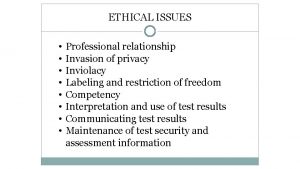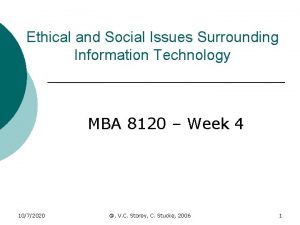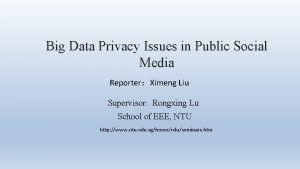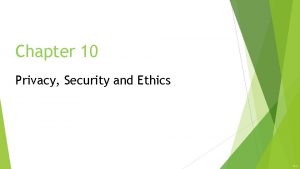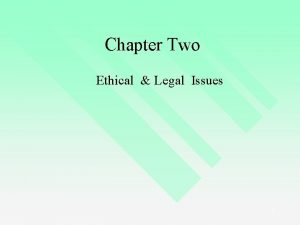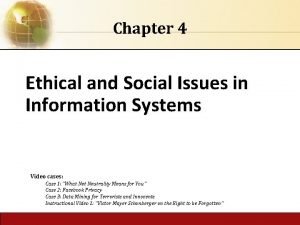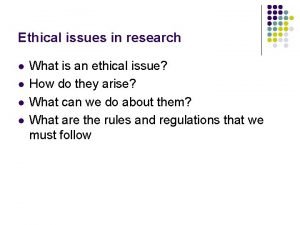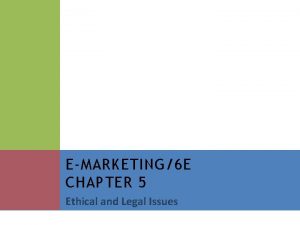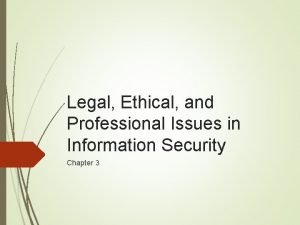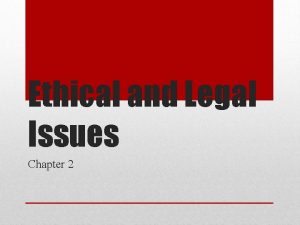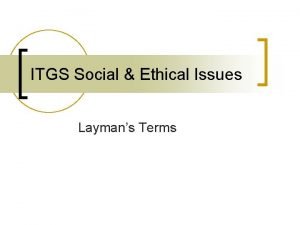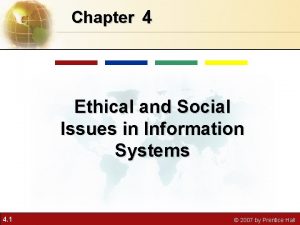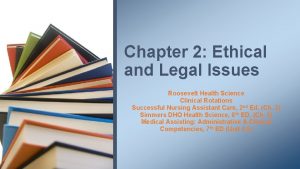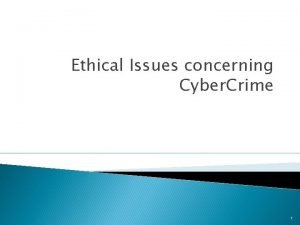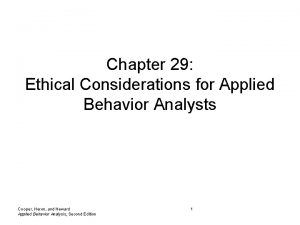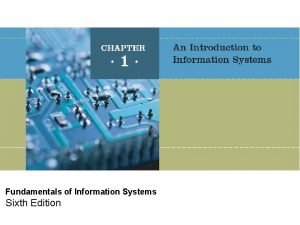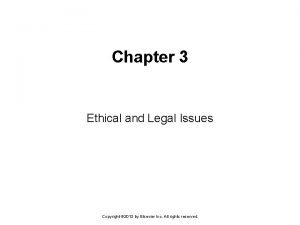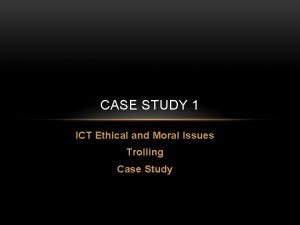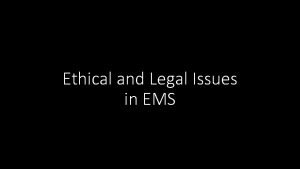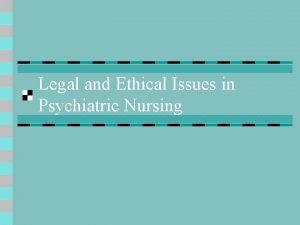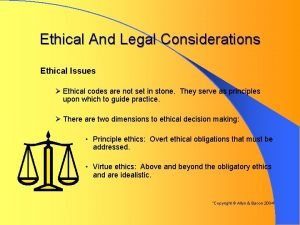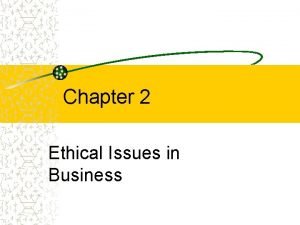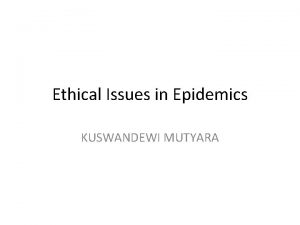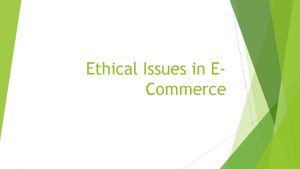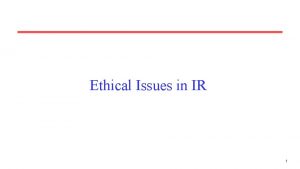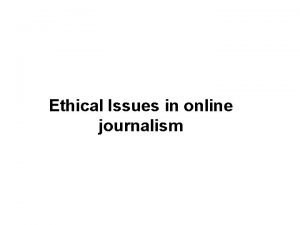ETHICAL ISSUES Professional relationship Invasion of privacy Inviolacy








































- Slides: 40

ETHICAL ISSUES • • Professional relationship Invasion of privacy Inviolacy Labeling and restriction of freedom Competency Interpretation and use of test results Communicating test results Maintenance of test security and assessment information

The main difference between a professional and a non 0 professional is that professionals take personal responsibility for their work.

Sources for Ethical Decisions �APA Ethical Principles of Psychologists and Code of Conduct �Code of Fair Testing Practices in Education (http: //www. apa. org/science/programs/testing/fair-testing. pdf) � Code of Ethics for Philippine Psychologists (http: //www. pap. org. ph/includes/view/default/uploads/code_of_ethics_pd f. pdf)

�Given the widespread use of tests, there is considerable potential for abuse. �A good deal of attention has therefore been devoted to the development and enforcement of professional and legal standards. �The American Psychological Association (APA) has taken a leading role in the development of professional standards for testing.

�The PAP shall take steps to ensure CODE OF ETHICS that all members of the PAP and the larger community of Philippine psychologists will know, understand, and be properly guided by this Code. As such the PAP will encourage continuous discussions on the Code and any of its specific provisions, with the goal of making the Code a priority concern for all Philippine psychologists.

�Finally, any person who has a strong basis for asserting that a member of the PAP, especially a Certified Psychology Specialist of the PAP, has violated any provision of this Code should inform the PAP in writing, and provide supporting evidence for the assertion. This information should be addressed to the PAP President and Board of Directors (ATTN: Scientific and Professional Ethics Committee). Upon receipt of such information, the PAP shall take steps to investigate, make appropriate actions, and place proper sanctions, if necessary.

DECLARATION OF PRINCIPLES �Psychologists in the Philippines adhere to the following Universal Declaration of Ethical Principles for Psychologists that was adopted unanimously by the General Assembly of the International Union of Psychological Science in Berlin on July 22, 2008 and by the Board of Directors of the International Association of Applied Psychology in Berlin on July 26, 2008

�The objectives of the Universal Declaration are to provide a moral framework and generic set of ethical principles for psychology organizations worldwide: (a)to evaluate the ethical and moral relevance of their codes of ethics; (b) to use as a template to guide the development or evolution of their codes of ethics; (c) to encourage global thinking about ethics, while also encouraging action that is sensitive and responsive to local needs and values; and (d) to speak with a collective voice on matters of ethical concern.

PRINCIPLE I – Respect for the Digni of Persons and Peoples �a) respect for the unique worth and inherent dignity of all human beings; �b) respect for the diversity among persons and peoples; �c) respect for the customs and beliefs of cultures, to be limited only when a custom or a belief seriously contravenes the principle of respect for the dignity of persons or peoples or causes serious harm to their wellbeing; �d) free and informed consent, as culturally defined and relevant for individuals, families, groups, and communities; � e) privacy for individuals, families, groups, and communities;

PRINCIPLE II – Competent Caring for the Well- being of Persons and � a) active concern for the well-being of individuals, families, Peoples groups, and communities; � b) taking care to do no harm to individuals, families, groups, and communities; � c) maximizing benefits and minimizing potential harm to individuals, families, groups, and communities; � d) correcting or offsetting harmful effects that have occurred as a result of their activities; � e) developing and maintaining competence; � f) self-knowledge regarding how their own values, attitudes, experiences, and social contexts influence their actions, interpretations, choices, and recommendations; � g) respect for the ability of individuals, families, groups, and communities to make decisions for themselves and to care for themselves and each other.

PRINCIPLE III - Integrity �a) honesty, and truthful, open and accurate communications; �b) avoiding incomplete disclosure of information unless complete disclosure is culturally inappropriate, or violates confidentiality, or carries the potential to do serious harm to individuals, families, groups, or communities; �c) maximizing impartiality and minimizing biases; �d) not exploiting persons or peoples for personal, professional, or financial gain; �e) avoiding conflicts of interest and declaring them when they cannot be avoided or are inappropriate

and Scientific Responsibilities to � a) the discipline’s responsibility to increase scientific and Society professional knowledge in ways that allow the promotion of the well-being of society and all its members; � b) the discipline’s responsibility to use psychological knowledge for beneficial purposes and to protect such knowledge from being misused, used incompetently, or made useless; � c) the discipline’s responsibility to conduct its affairs in ways that are ethical and consistent with the promotion of the well-being of society and all its members; � d) the discipline’s responsibility to promote the highest ethical ideals in the scientific, professional and educational activities of its members; � e) the discipline’s responsibility to adequately train its members in

Informed Consent in Assessments �Obtain informed consent for assessments, evaluations or diagnostic services, EXCEPT when: (1)testing is mandated by law or governmental regulations; (2) informed consent is implied because testing is conducted as a routine educational, institutional or organizational activity (e. g. , when participants voluntarily agree to assessment when applying for a job);

(3) one purpose of the testing is to evaluate decisional capacity. Informed consent includes an explanation of the nature and purpose of the assessment, fees, involvement of third parties and limits of confidentiality and sufficient opportunity for the client/patient to ask questions and receive answers.

Psychologists inform persons with questionable capacity to consent or for whom testing is mandated by law or governmental regulations about the nature and purpose of the proposed assessment services, using language that is reasonably understandable to the person being assessed.

Release of Test Data �Test data refers to raw and scaled scores, client/patient responses to test questions or stimuli and psychologists' notes and recordings concerning client/patient statements and behavior during an examination. Those portions of test materials that include client/patient responses are included in the definition of test data.

� Pursuant to a client/patient release, psychologists provide test data to the client/patient or other persons identified in the release. � Psychologists may refrain from releasing test data to protect a client/patient or others from substantial harm or misuse or misrepresentation of the data or the test, recognizing that in many instances release of confidential information under these circumstances is regulated by law.

In the absence of a client/patient release, psychologists provide test data only as required by law or court order.

�Should take into account the purpose of the assessment as well as the various test factors, testtaking abilities and other characteristics of the person being assessed, such as situational, personal, linguistic and cultural differences, that might affect psychologists‘ judgments or reduce the accuracy of their interpretations. They indicate any significant limitations of their interpretations

Assessment by Unqualified Persons � Psychologists do not promote the use of psychological assessment techniques by unqualified persons, except when such use is conducted for training purposes with appropriate supervision.

Obsolete Tests and Outdated Test Resu � Psychologists do not base their assessment or intervention decisions or recommendations on data or test results that are outdated for the current purpose. � Psychologists do not base such decisions or recommendations on tests and measures that are obsolete and not useful for the current purpose.

Test Scoring and Interpretation Service � Psychologists who offer assessment or scoring services to other professionals accurately describe the purpose, norms, validity, reliability and applications of the procedures and any special qualifications applicable to their use. � Psychologists select scoring and interpretation services (including automated services) on the basis of evidence of the validity of the program and procedures as well as on other appropriate considerations

� Psychologists retain responsibility for the appropriate application, interpretation and use of assessment instruments, whether they score and interpret such tests themselves or use automated or other services.

Maintaining Test Security � The term test materials refers to manuals, instruments, protocols and test questions or stimuli and does not include test data � Psychologists make reasonable efforts to maintain the integrity and security of test materials and other assessment techniques consistent with law and contractual obligations, and in a manner that permits adherence to this Ethics Code.

RIGHTS OF TESTTAKERS �Informed consent The right to know why they are being evaluated. How the test data will be used. What (if any) information will be released to whom? In a language the testtaker can understand. �Generally, the client/subject must voluntarily consent. � Psychologist must inform client about nature and purpose of assessment in understandable language

Informed consent - exceptions �Sometimes, it is acceptable to test without getting consent – e. g. , you have given implied consent to be tested by registering in a specific course. �Sometimes it is necessary to test without getting consent, even when consent is explicitly refused by person to be tested – e. g. , when mandated bylaw

Least Stigmatizing Label �If categories are used, must be described precisely. �Sometimes diagnosis is related to treatment and even if counselor is trying to be helpful, it is both illegal and unethical to change a diagnosis.

DEBRIEFING Post-administration debriefing should: �Restate purpose of testing. �Explain how the results will be used (usually, emphasize that the interest is in the group findings). �Reiterate that findings will be treated confidentially. �Answer all of the respondents questions fully. �Thank the examinee.

Factors Not Under the Examiner’s Control � 1. How fatigued a test taker is. � 2. Motivation level of the test taker. � 3. Physical Discomfort � 4. Test Anxiety

Ethnic and Cultural Variables �Knowledge of attitudes of various racial, ethnic, or cultural groups toward testing. �Ability to determine language proficiency.

� Ability to determine the potential effects of different test settings on different racial, ethnic, or cultural groups. � Knowledge of specific biases that have been demonstrated for particular tests for individuals or groups of individuals from particular racial, ethnic, or cultural minority groups.

Test Use & Test Fairness �A test is most likely to be seen as unfair when: 1. It is the sole basis for the decision. 2. The consequences of doing poorly on the test is harsh. �Ways to reduce concerns over test unfairness: 1. Multiple assessment procedures 2. Use more intensive screening procedures for those likely to be treated unfairly by a given test

Test Fairness �People with different values often disagree over the fairness of some testing practices. �Factors that affect testing fairness: 1. Obstacles that prevent people from performing well 2. Test may provide unfair advantage to some people 3. Some tests are not valid and used in wrong situations 4. Some tests are used for purposes that are inherently objectionable

Ethical Issues in Psychological Assessment in School Settings

Most Frequent Ethical Issues Psychologists Confront 1. ) Process of parental consent and involvement. 2)Obligation to select nonbiased test instruments and use them in a way that is not racially or culturally biased. 3)Appropriate administration and interpretation of projective tests in school settings. 4) Use of computerized psychological assessment

N ondiscriminatory Assessment �Psychologists are obligated to be culturally sensitive in administering tests to pupils. �Impact of assessing pupils without utilizing their native language. �Impact of discrepancies caused by translators. �Ensure pupil’s ability to read prior to test administration. �Is ‘language’ the root of the pupil’s academic problems?

Computerized Psychological Testing �Ethical issues in the use of computerized testing: accountability for the psychological assessment. appropriate application, interpretation, and use of assessment instruments. disparity between automated report and the psychologist’s clinical impression of the client.

�Questions regarding the validity of computer- assisted assessment lack of demonstrated validity for the printed interpretations they generate. test developer should establish validity and reliability of the test and resulting interpretations should be done with a professional review.

�A school psychologist should review and edit the narrative report done by the computer, so that it is specific to the individual who was tested. Test administration procedures and supervision of assistants. familiarity with the instruments to be used.

�Computer programs are not a substitute for supervision because they are not designed to teach testing skills to the individual who uses these programs. must be used in conjunction with the clinical judgment of well-trained professionals psychologists are responsible in determining whether the test results are valid for a particular individual
 Inviolacy
Inviolacy Professional issues in information security
Professional issues in information security Professional and ethical issues during internship
Professional and ethical issues during internship Privacy awareness and hipaa privacy training cvs
Privacy awareness and hipaa privacy training cvs Issues surrounding information privacy
Issues surrounding information privacy Big data privacy issues in public social media
Big data privacy issues in public social media Three primary privacy issues are accuracy property and
Three primary privacy issues are accuracy property and Ethical lens of the ethical reasoning model
Ethical lens of the ethical reasoning model Csr and business ethics
Csr and business ethics Ethical habits
Ethical habits Perbedaan ethical dilemma dan ethical lapse
Perbedaan ethical dilemma dan ethical lapse Chapter 2 ethical and legal issues
Chapter 2 ethical and legal issues Chapter 4 ethical issues
Chapter 4 ethical issues Ethical issues in group counseling
Ethical issues in group counseling Ethical and legal issues affecting the nursing assistant
Ethical and legal issues affecting the nursing assistant Chapter 6 legal and ethical issues
Chapter 6 legal and ethical issues Ict ethical issues
Ict ethical issues Ethical issues in research
Ethical issues in research Legal and ethical issues in use of ict
Legal and ethical issues in use of ict Legal and ethical issues chapter 5
Legal and ethical issues chapter 5 Legal and ethical issues in information security
Legal and ethical issues in information security Chapter 2 ethical and legal issues
Chapter 2 ethical and legal issues Itgs social and ethical issues
Itgs social and ethical issues Ethical issues in nike
Ethical issues in nike Chapter 4 ethical and social issues in information systems
Chapter 4 ethical and social issues in information systems Chapter 2 ethical and legal issues
Chapter 2 ethical and legal issues Cyber crime definition
Cyber crime definition Ethical issues in applied behavior analysis
Ethical issues in applied behavior analysis Ethical issues in treating lgbt patients
Ethical issues in treating lgbt patients Chapter 4 ethical and social issues in information systems
Chapter 4 ethical and social issues in information systems Chapter 3 ethical and legal issues
Chapter 3 ethical and legal issues Ethical issues in accounting and finance
Ethical issues in accounting and finance Ethical social and political issues in e-commerce
Ethical social and political issues in e-commerce Facebook ethical issues case study
Facebook ethical issues case study Ethical issues in precision medicine
Ethical issues in precision medicine Ethical issues in health promotion
Ethical issues in health promotion Ethical issues of genetic engineering
Ethical issues of genetic engineering Pww ems law
Pww ems law Ethical issues in psychiatric nursing
Ethical issues in psychiatric nursing Ethical issues in entertainment media
Ethical issues in entertainment media Ethical issues in e marketing
Ethical issues in e marketing
